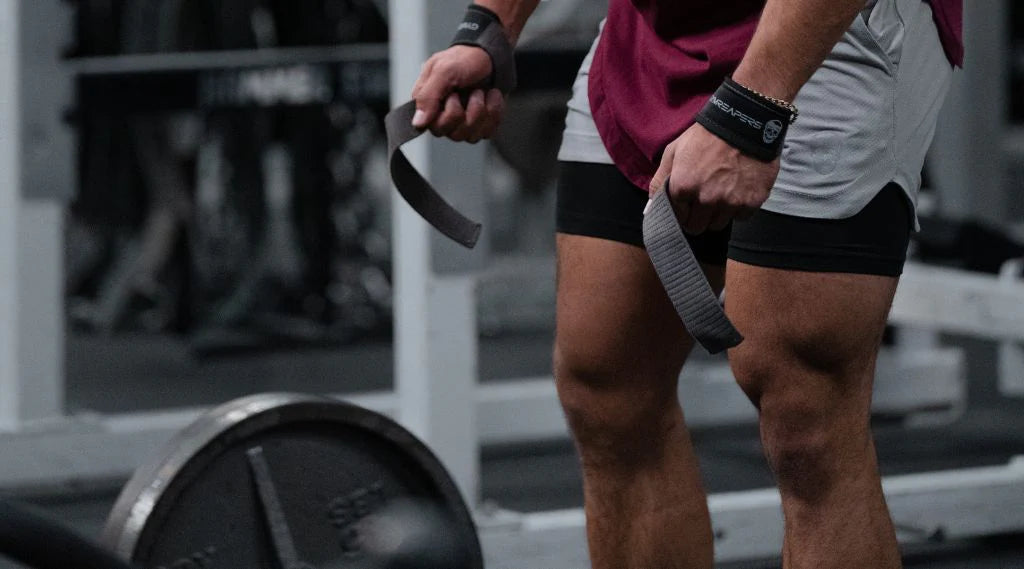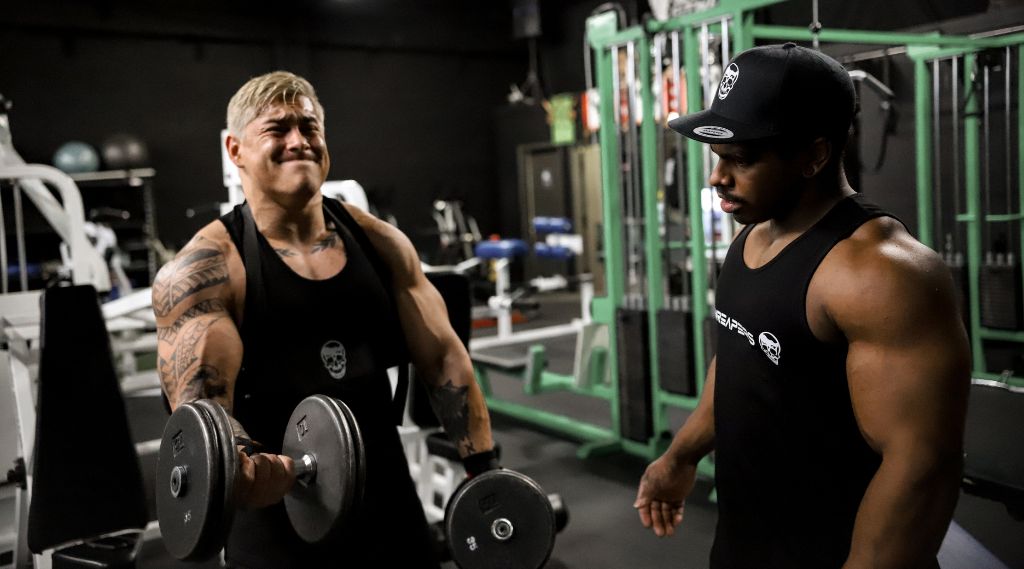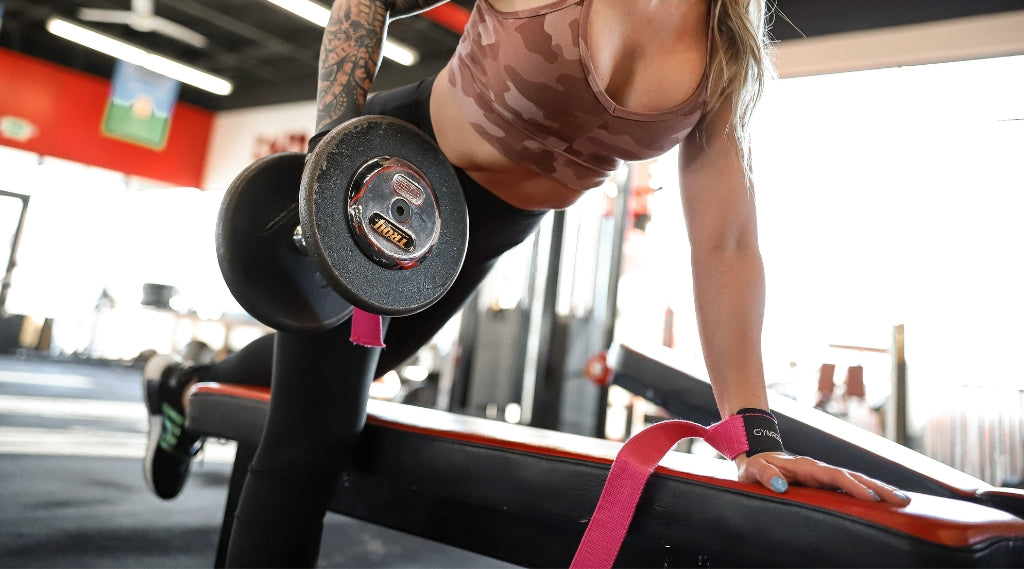There is a popular debate in the fitness industry about the use of lifting straps and if they are considered cheating.
To help you decide whether or not lifting straps are considered cheating, I’ll explain the controversy, when you’re allowed to use them and when you aren’t, and why I personally don’t think straps are cheating (coming from a strength coach’s perspective).
Key Takeaways
Lifting Straps: Addressing The Controversy

In the age of social media, lifting straps have become more controversial than ever because they can increase a lifter's max deadlift beyond what they could do without straps.
This is because grip is often a limiting factor for movements like the deadlift, and the use of straps eliminates grip as a limiting factor allowing lifters to lift more weight.
In extreme cases, lifters can lift 150-200 lbs more with straps than they can without them. to the lift that has become increasingly popular: the deadlift (specifically the sumo deadlift).
While some individuals swear by their effectiveness in enhancing performance, others argue that using lifting straps is nothing short of cheating.
This controversy may prevent some lifters from using lifting straps, so we need to dive into the reasons why people claim that straps are cheating to see if their reasons are valid.
Why Some People Think Lifting Straps Are Cheating

Here are the 3 key points people bring up when claiming that lifting straps are cheating:
Point #1: The Sumo Deadlift Advantage
The most common reason that people think lifting straps are cheating is that when combined with a sumo deadlift, straps can be used to decrease the range of motion and allow the lifter to get into positions they could not achieve without the use of straps.
Lifters will use straps to hang the bar as close to the ends of their fingertips as they can get them. This decreases the range of motion of the movement while also allowing sumo deadlifters to get a more upright position that allows for better leverage on the bar.
In extreme cases, this allows lifters to significantly increase their deadlift 1-rep max from what they can achieve without the use of lifting straps.
While this would definitely be considered cheating in competition, there are no rules against what is allowed or not allowed in the gym.
If lifting this way brings an individual a sense of joy and accomplishment and they know that it wouldn’t count by powerlifting competition standard, then I personally don’t think there’s any harm in using straps for sumo deadlifts in the gym.
Point #2: Grip Strength
Others believe straps are cheating because you should be training your grip on all movements. This is based on the belief that if you can’t lift a certain weight by yourself (no use of equipment) then it doesn’t count.
However, there are plenty of powerlifters who use straps in training but still set records without them in competition; so clearly, grip strength isn’t an issue.
For example, here’s Amanda Lawrence (who has deadlifted ~590 lbs in competition) using straps in training:
Point #3: Not Allowed In Competition
Finally, some believe that using straps is cheating because they are not permitted in most competitive settings. As a strength coach, I can confirm that this is the most valid point of support for lifting straps being considered cheating.
However, it also depends on the sport they are referencing:
Strongman: Always Allowed
Strongman does permit the use of straps in all competitions. In some events, straps may get in the way more than they help so competitors may choose not to use them but they are permitted for the deadlift and most events.
The only events that exclude the use of straps are events designed to test the competitor's grip strength like the crucifix hold.
CrossFit: Sometimes Allowed
All CrossFit competitions are different and therefore so are the rules of the events being performed. Most events exclude the use of straps, however, they are allowed in some events from time to time in competition.
Despite this, the use of straps in training is very common in CrossFit.
Powerlifting: Never Allowed
The use of straps is not allowed in most powerlifting competitions. In the IPF (the world's biggest powerlifting federation) and all the country federations that fall under it, straps are banned in competition.
The same goes for the USAPL federation; however, there are some smaller federations and the USPA that make exceptions for lifters with hand-related disabilities.
Olympic Lifting: Never Allowed
Olympic weightlifting does not allow the use of lifting straps in competition even though the use of straps in training for Olympic weightlifters is common practice.
Ultimately, If you break the rules to use lifting straps when they’re not allowed, then of course you’re cheating; but if you’re using them in training, is it really considered cheating?
4 Reasons Why I Recommend Using Lifting Straps

As a strength coach, I believe that the notion of lifting straps being considered cheating largely depends on the context and purpose of your training.
Most would agree they ARE NOT cheating due to the many benefits of wearing them, benefits that ANYONE can take advantage of if they want to.
Here’s my reasoning:
Reason # 1: They Allow You To Target Muscle Groups More Effectively
Straps are a bodybuilder's best tool. Straps allow you to target the intended muscle groups without being limited by your grip.
This is common practice for targeting your rhomboids better on rows, lats better on lat pull downs, and hamstrings better on Romanian deadlifts.
Most lifters will find that after the first 6-9 months of proper training, their forearms tend to be the limiting factor on many exercises rather than the target muscle group. Using straps is the best solution to work around this and build muscle.
Reason #2: They Are A Great Tool For Hook Grip Deadlifters
The hook grip technique is used in powerlifting and weightlifting to secure your grip on the bar and prevent the bar from slipping out of your hands.
A hook grip is when lifters wrap their fingers over the top of their thumbs and then grip the bar. Here’s a video for reference:
A hook grip is a great alternative to work around weak grip strength; however, a major downside of a hook grip compared to straps is that it’s hard to maintain after a couple of reps because it’s very uncomfortable.
Straps are a great tool to be able to get the benefits of higher repetition deadlifts without having to worry about a lack of grip strength or the discomfort of performing rep work with a hook grip.
Reason #3: They Help You Work Around Injuries Or Disabilities
Straps are a great tool for anyone with hand injuries or hand-related disabilities. They can be used for most movements performed at the gym that require you to grip a weight.
If the inability to use your hand is holding back your ability to reach your fitness goals, straps are definitely the best workaround.
Reason #4: They Allow You To Handle More Training Volume
Often our progress in the gym, whether it be strength or hypertrophy-focused, has to do with the amount of work or training volume we can perform in a given session, week, or month.
Straps allow us to handle more training volume for the major muscle groups while reducing the work done by the forearm muscles, which can lead to much greater progress in the gym by reducing grip fatigue.
How Much More Can You Expect To Lift With Lifting Straps?
Lifting straps can significantly increase your lifting capacity by removing the grip as a limiting factor. While the exact increase in lifting capacity will vary from person to person, it is not uncommon to witness improvements of 50 lbs to 200 lbs.
If using straps properly, with the bar anchored as normal, you can expect at least a 20-50lb increase in deadlift strength.
However, some strap users anchor the bar lower into their hand and can lift up to 200 lbs more with straps than they can without straps.
In addition to deadlifts, you can expect a 10-15% increase in accessory exercises like rows, pull-ups, and RDLs when using straps by eliminating grip as the limiting factor.
Should You Use Lifting Straps In Training?
The decision to use lifting straps ultimately depends on your training goals and the specific exercises you engage in.
If your priority is to build strength and compete in the sport of powerlifting, it is beneficial to develop a strong grip without relying heavily on lifting straps and to only use them as needed (for high-rep work and accessories) in training.
If you are targeting specific muscle groups for hypertrophy, using lifting straps can help you isolate those muscles without grip strength being a limiting factor.
Although lifting straps aren’t cheating, It is important to strike a balance between developing grip strength and utilizing lifting straps as a tool to enhance your training to get the best of both worlds.
Best Lifting Straps To Use In Training
The best lifting straps to use will depend on the intended use. Here are my recommendations:
For Beginners & Recreational Powerlifters

The Gymreapers Padded Lifting Straps are best for beginner and recreational powerlifters because they’re easy to use, reliable, and extremely comfortable thanks to the padding around the wrist.
For Competitive Powerlifters & Strongmen

The Gympreapers Figure 8 Straps are the best straps for competitive strength athletes because they provide maximum grip to help you lift the most weight possible.
For Olympic Weightlifters

The Gymreapers Olympic Lifting Straps are designed specifically for weightlifters performing the snatch and clean and jerk because they easily release from the bar to keep lifters safe.
For Those Who Hand Injuries Or Hand-Related Disabilities

The Gymreapers Lifting Hooks are the best option for those who want to take their hands out of the equation. The lifting hooks attach to your wrist and hook around barbells and dumbbells so that you can lift the load with the use of your hands.
These hooks are perfect for those who can't use their hand to grip bars, dumbbells, or machines to perform exercises.













Leave a comment
All comments are moderated before being published.
This site is protected by hCaptcha and the hCaptcha Privacy Policy and Terms of Service apply.